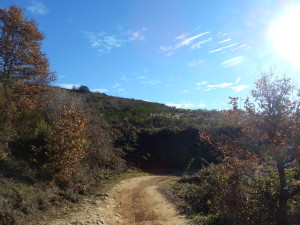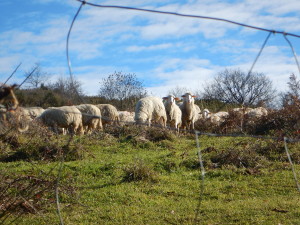
For the past few months, I have been having Italian lessons with a wonderful teacher who has insisted that I just speak – ‘avanti, avanti’ – without thinking about making perfect sentences, without worrying about making mistakes. ‘Keep it simple’, my teacher says, ‘listen’, and ‘ask questions’. This is the way to make contact. If you are thinking about grammar and how to construct your next sentence, you’re likely to lose contact.
My Italian is very basic, so I have no choice but to allow myself to let go of any pretence of sophistication if I am going to communicate with people. Following my teacher’s advice, all I’m doing is having a go, and being interested in what people have to say. And, I’ve noticed, even after only a few days here, that this makes a difference to my encounters. Apparently small, but significant shifts are happening.
My hunch is that what has happened is that I’ve given myself permission to be childlike, and that this invites a response in others. For example, Letizia, my favourite fruit and vegetable lady, is visibly happy that I am speaking more than previously, in whatever fashion it might be. She hugs me when I try new constructions (made possible, precisely because I feel unself-conscious with her); and, with a big smile, she is quite happy to offer corrections: we repeat the sentence, the phrase, together. I don’t feel corrected; I feel encouraged. What is wonderful about all of this is that ‘strange’ words coming from me are finding a response in another. We are making contact!
Letizia is someone I know, but encounters with strangers are similarly changing. There are always shared greetings – ‘buon giorno’, ‘buona sera’ – on paths in the country, and often on the streets of small towns like Anghiari, but, on walks in the past couple of days, a little more than this has been happening. In this post, I will just recount yesterday’s experience.
We decided to do a walk where, on a previous occasion, we had come across sheep with lovely sounding bells, watched over by a sheep dog. As we steadily climbed up the path, we realized that we were following a trail of fresh sheep poo, and then we met a youthful middle-aged man walking down the hill, with a sheep dog. He cheerfully wished us well in the bellissima giornata that it was. After about another half hour, we heard the bells in the distance. High up in heath-like hills, we had a picnic with the sheep (that look nothing like Australian sheep) from whom the precorino comes. It was on the return trip that we learnt more about those sheep.
We met a woman on the path, out walking, with, what turned out to be, her grandchildren, and a puppy. The combination of children, puppy and my childlike Italian allowed us to pause and talk. We learnt that the nearby hamlets were part of a cooperative (La Cooperativa Agricola Montemercole) about which I’d been reading with interest. She told us that the community consists of about 50 people, and in these hamlets they raise sheep and cows for their milk. Some distance away, there is another hamlet, where pigs, vegetables and vines are grown. And did we know that they now have a bottega in Arezzo where they sell their organic, preservative-free products, she asked, with obvious pride.
I had rather been hoping to find out more about this interesting sounding community, and now, here, we’d stumbled upon it. Of all the walking paths that wind through these wild Appennini hills, we had chosen this one, near the cooperative. But I would never have known that if I hadn’t asked ‘where do you live?’
Ann
How wonderful that after your lessons in Italian, you are now freely talking and most importantly, enjoying your conversations.
I’m really enjoying reading your adventures!